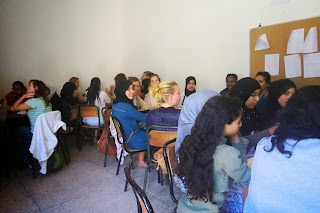We are developing a project in collaboration with the delegation of the Ministry of Education in Sidi Ifni, that seeks to provide an e-learning, Information and Communication Technology (ICT)-based education platform for a girls’ boarding school in the poor, rural county of Mesti, southwest Morocco. Girls between the ages of 11 and 18 who reside at the boarding school are the first generation of Berber girls to pursue their education and live away from their traditional, conservative families and households. These girls are the few to reach high school and the first generation to continue their education; their mothers remain illiterate and innumerate. Despite this progress, the girls are poorly trained and have limited educational background to pursue higher education.
Within this poor, remote region, there is limited access to information, lack of up-to-date scientific data, high-turnover of teaching body, and a multilingual environment where limited language proficiency compromises knowledge-transmission. The girls have no alternative to support them with their academic performance other than regular classes at school which are not sufficient. The girls live in basic dorms with no assistance that ensures they follow the curriculum properly or allows them to discover other academic interests, especially scientific ones deemed to be exclusively “boys’’ domains; girls are neither trained nor encouraged to choose scientific paths. When these young women take their final high-school exams and join post-secondary education, their performances are weak and cannot compete with their city-educated peers. For those to make it to the university, the choice of disciplines is limited to the humanities, a field that carries little value for the job-market. Furthermore, the dropout rate among the girls remains high, thus crushing the dream of education empowering and transforming lives.
Within this poor, remote region, there is limited access to information, lack of up-to-date scientific data, high-turnover of teaching body, and a multilingual environment where limited language proficiency compromises knowledge-transmission. The girls have no alternative to support them with their academic performance other than regular classes at school which are not sufficient. The girls live in basic dorms with no assistance that ensures they follow the curriculum properly or allows them to discover other academic interests, especially scientific ones deemed to be exclusively “boys’’ domains; girls are neither trained nor encouraged to choose scientific paths. When these young women take their final high-school exams and join post-secondary education, their performances are weak and cannot compete with their city-educated peers. For those to make it to the university, the choice of disciplines is limited to the humanities, a field that carries little value for the job-market. Furthermore, the dropout rate among the girls remains high, thus crushing the dream of education empowering and transforming lives.

We are developing an interactive e-learning platform that is accessible and easy-to-learn, consisting of connecting the girls to certified instructors via ICT hardware. These include mobile phones, tablets, laptops and software and services such as text messaging, online learning platforms, social media and multimedia. We aim to equip the girls with skills that can improve their academic performance, enhance their motivation, increase their choices for future university studies.
This is a capacity-building project that enhances young women’s education and introduces the fields of science and technology to them by breaking the taboo that women do not belong in science. Once the girls complete the program and finish high school, they will be better trained to pursue further education in nearby cities and extend their scope of possibilities to include science and technology. As women gain prosperity, both economically and socially, families feel more assured and accepting of female education as a process of community empowerment and growth.
American students from Rollins College visit the girls at the boarding school in Mesti, May 2013
Please support us by donating at: http://www.globalgiving.org/projects/e-learning-education-for-rural-girls-in-morocco/


